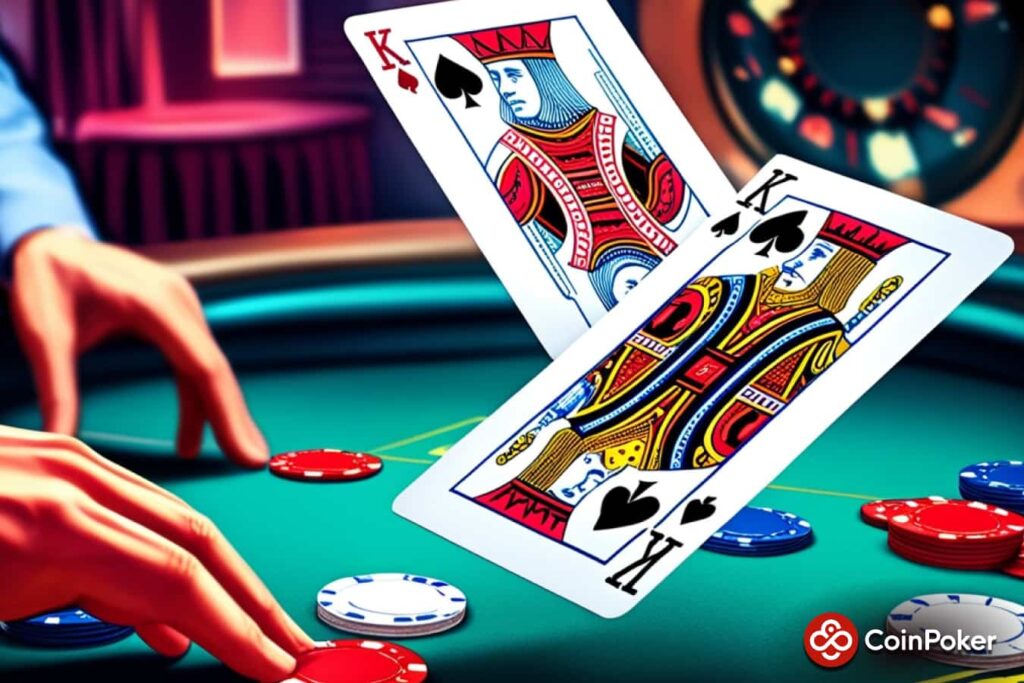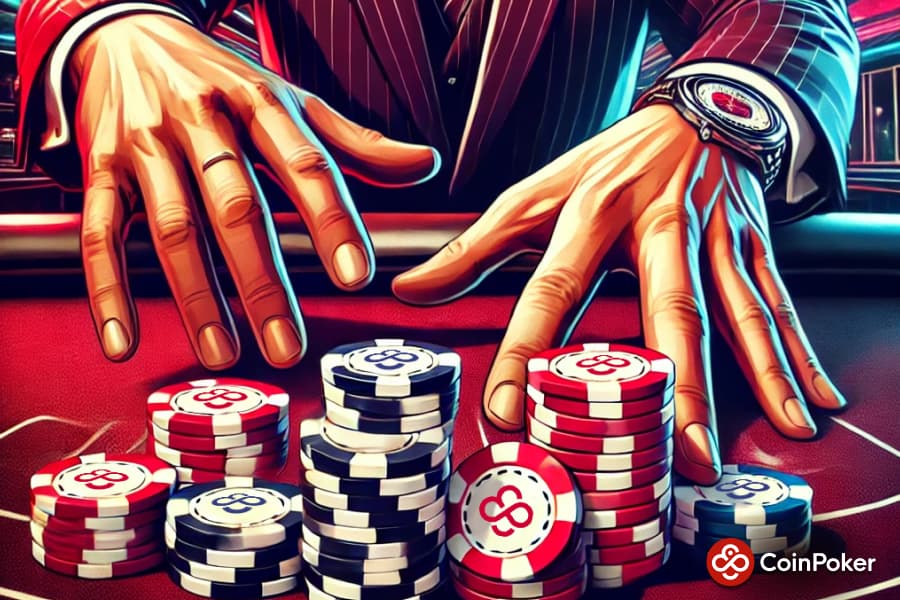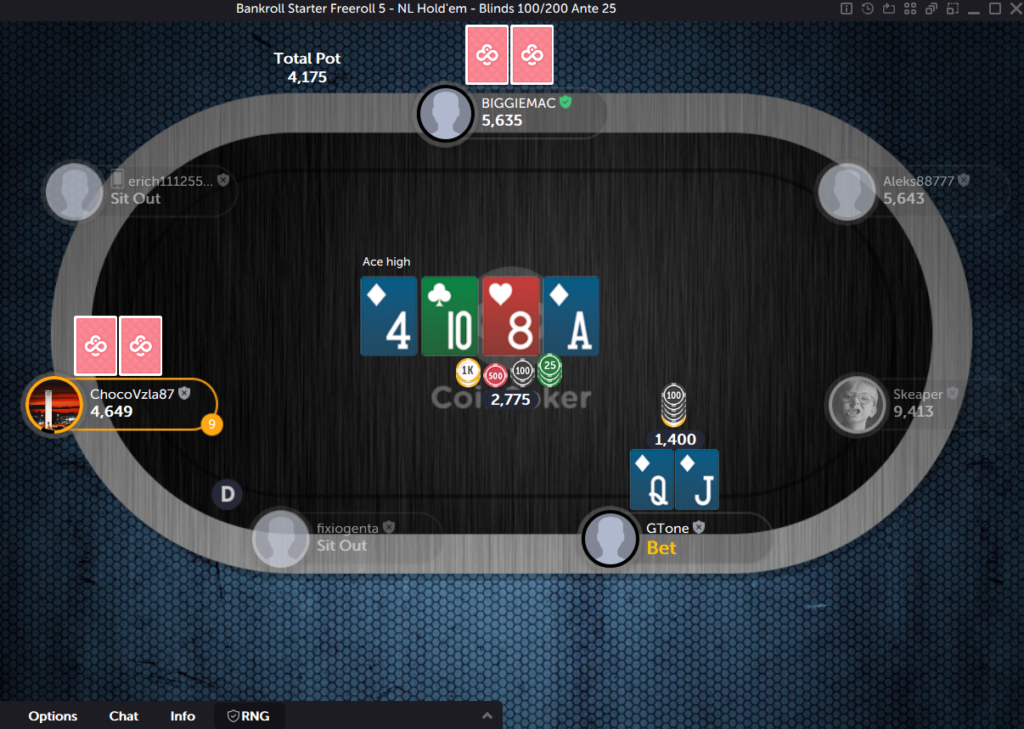Last Updated: 4 February 2026
Who Invented Poker? The Game’s Origins and Overview
Have you ever wondered who invented poker and where it comes from? Many poker fans before you have asked the same questions and found no clear answer. While poker is a simple game to learn, its origins are deeply complex.
Culture
Millions of people around the world play poker, but that doesn’t mean they know where it came from. For that reason, we’re embarking on a journey into the past to find out who invented poker, when it was first played, and how it became the beloved game we all know today.
What Is Poker?
When the word “poker” comes up in conversation, most people think of Texas Hold’em. While that type of poker is the most popular variation, many other games fall under the umbrella term.
Poker is a name used to describe dozens of different card games, all of which share a number of similarities. Any card game with multiple betting rounds, the ability to bluff, and played with a standard deck of playing cards falls into the category of poker games. While poker rules differ from one game to another, the general goal is mostly the same, and the ways of accomplishing it are fairly similar. A few popular ones include Texas Hold’em, Pot Limit Omaha, Seven Card Stud, 2-7 Triple Draw, Five Card Draw, and others.
In practically all poker variants, players take turns making bets on sets of cards, some or all of which are hidden from others. Players typically bet big when they have strong poker hands, but can also do so when they are bluffing to force opponents out of the game.

Who Invented Poker?
So, who invented poker, and where did the game come from?
Historians differ on their answers. Some connect poker with games played by the ancient Chinese, well before the new era. Others believe the 16th-century Persian game of As Nas to be the true predecessor to poker. However, most agree that Poque, a 17th-century French game created among nobles, is the most modern relative to modern poker. In Germany, the game was also adopted in the 1500s and called Pochen, with both originally deriving from a Spanish game known as Primero. This was the first known game that clearly included the concept of bluffing, a key element of poker.
From France, the game traveled across the Atlantic Ocean to the New World in the early 19th century, where it became popular in the colony of New Orleans. Its popularity increased during the Civil War, and it eventually made its way back to Europe in a form more similar to modern poker games.
Who Invented Texas Hold’em Poker?
But who invented the most popular variant of poker? The game of Texas Hold’em Poker is by far the most beloved poker version, and you might be able to guess where it came from. As the name suggests, Texas Hold’em Poker was invented in the state of Texas. The Texas Legislature recognizes the town of Robstown as the official birthplace of Texas Hold’em, although the exact inventor remains anonymous.
While we will probably never know who invented Texas Hold’em Poker, we do know it was Felton “Corky” McCorquodale who first brought it to Las Vegas. After becoming popular in Las Vegas casinos in the 1960s, Texas Hold’em spread like wildfire, and became known as “the Cadillac of poker” in the decades to come.

Who Invented Omaha Poker?
Unlike Texas Hold’em, it is much more clear who invented Omaha poker. The game was invented by poker player and marketing expert Robert Turner, who decided Texas Hold’em simply wasn’t exciting enough. He added two more cards to drive action and introduced the game to his friends in the casino circles.
He first brought Omaha poker to Las Vegas, Nevada in 1982 and introduced it to the owners of the Golden Nugget Casino. They loved the game and offered it as Nugget Poker. A few years later, Turner introduced the game to the California casinos as well, and it quickly became one of the most popular poker variations in the world.

Who Invented Poker Cards?
The history of playing cards used to deal poker today spans far into the ancient past. Since ancient playing cards used to be made out of materials like wood, ivory, and paper, historians struggle to find intact examples after hundreds of years.
Most scholars agree that modern cards have their roots in ancient China, although the cards used by the Tang Dynasty members were significantly different than the ones we use today.
The first written record that clearly speaks about playing cards comes from a German monk Johannes, who wrote about them in 1377.
The exact origin of playing cards is a highly debated topic, but it is clear that the “Latin suits” we use today were invented in the 14th century by European nobles. In the early days, all playing cards were hand-crafted, which made them works of art.

Who Invented Poker Chips?
Modern casino chips were invented relatively recently, but people have been gambling with items representing value for centuries. Archeological findings indicate that even prehistoric people gambled with stones of different colors, and more recent history shows a variety of items known as “counters,” which were used in various gambling games.
Counters were introduced to allow players to settle up their bets in items of actual value after the game, which eventually lead to the creation of first real poker chips. Such chips were invented in the 1800s by the early casinos in the USA and Europe, and were made of wood and metal.
The dimensions and shapes of chips have changed over the years. It was eventually decided that round chips work best. Modern poker chips maintain a round shape, with materials like plastic and clay usually used in their manufacturing.

Who Invented Online Poker?
We have talked about who invented poker, but what about online poker?
Online poker games are massively popular today, but they didn’t exist a few decades ago. However, it wasn’t long after the advent of the internet that the first online poker sites also launched.
In 1997, a site called Planet Poker was founded by Randy Blumer and endorsed by Mike Caro, a known figure in the poker community. Shortly after Planet Poker, Paradise Poker also opened its doors, and quickly amassed two million users to play poker games over the internet.
The early internet was not the safest place for real money games, but millions of players signed up from around the world regardless. It did not take too long for other poker sites like PartyPoker, PokerStars, and Full Tilt Poker to join the fray, and online poker as we know it today was born.

Who Invented GTO Poker?
Game theory optimal (GTO) poker strategy is all the rage these days, but GTO is not limited to poker. It’s based on mathematical principles that date back to the 1950s and applied in plenty of other places. Game theory was invented by mathematician John von Neumann and economist Oskar Morgenstern. It was an attempt to use mathematics to solve competitive games, and it was a massive success.
A 2006 book by Bill Chen popularized a game theory optimal approach to poker called “The Mathematics of Poker,” which dug deep into the ideas of GTO. Over the next decade, poker players looked for ways to apply GTO to poker and eventually created poker solvers to create optimal solutions for poker hands and create a poker strategy that other players could not exploit.
Now, GTO is not a magic bullet for all poker situations, but it has become a sort of road map to unexploitable play (especially for high-stakes games).

Poker’s Timeline: From Its Origins to Present Day
The game of poker has evolved through different stages over the centuries. From early games like Poque and Pochen, over the first poker variations in American colonies, to modern poker, it’s been an epic journey filled with tales and legends.
Let’s take a dive into the history of poker and find out how it changed over the centuries, who impacted it the most, and how it became the global phenomenon it is today.
Where Does the Word Poker Come From?
The word “poker” is used to describe a number of card games today, but where did it originally come from? Two main theories indicate the game got its name either from French Poque or German Pochen, two games that are similar to poker and are considered its predecessors.
The German name Pochen came from a word that roughly translated into “to brag about bluffing,” which is what original poker was all about. The word was adapted in different nations that adopted the game, but the idea of bluffing your opponent and revealing the trick to onlookers remains universal—even today.
Poker From the 19th to the 21st Century
The game of poker rose to prominence in the 19th century when French colonists brought it with them to the New World. There, the French game Poque became popular and soon spread across America and beyond.
Here is a look at the historical progression of poker’s worldwide spread:
- 19th Century: French colonists bring Poque to America. The game became popular in New Orleans, which joined the USA following the Louisiana Purchase. Americans adapted the name to “poker”, introduced a 52-card deck, and started dealing five cards to each player.
- 20th Century: The late 19th and early 20th century saw poker come back to Europe for the enjoyment of French royalty and nobles. American soldiers introduced the game to their allies during WW1, popularizing the game among the wider masses in Europe. Stud games were popular in the earlier decades, with Texas Hold’em introduced in the 1970s.
- 21st Century: Online poker was invented and millions of players joined the game. With more access, the popularity of the game soared to new heights. Poker rooms opened around the world, and online poker sites hosted massive poker tournaments. Texas Hold’em was immediately dominant, with variants like Pot Limit Omaha and Short Deck Poker also rising in popularity.
Pochen, Poque, and Other Poker-Like Games
There are many poker variations played around the world today, but they all came from games that differ quite a bit from modern poker. Some of these include Primero, Poque, and Pochen, which we have mentioned earlier in the text.
- Primero: A game played by the Spaniards and Italians in the 1500s, Primero was played with a 40-card deck, four cards to a player, and hand rankings that vaguely resemble modern poker hierarchy. Betting rounds, bluffing, and folding were all a part of Primero, which makes it an early predecessor of poker.
- Poque: Considered as the direct father of poker, the French game of Poque was played with 32 cards in total and a special Poch board. Each player receives five cards and a trump suit is chosen. Players reveal their cards and make bets, with the ability to value bet or bluff—the essential element of poker.
- Pochen: The German game of Pochen, whose name quite literally meant “to bluff,” was popular in the 17th and 18th centuries. Much like modern poker, Pochen is a game of incomplete information, allowing for bluffs and costly blunders for everyone involved.
How Has Poker Changed Since Its Invention?
Poker has been around for at least 200 years, and in that time, it has undergone many evolutions. From primitive poker games with incomplete decks and vague rules, modern poker has become a competition, akin to sports in many ways.
Here are some of the key things in poker’s history that defined it and made it what it is today:
- Invention of New Poker Games: Over the centuries, players have invented dozens of poker games. The two most popular games today are Texas Hold’em and Pot Limit Omaha, but poker games like Five Card Draw and Seven Card Stud dominated until just a few decades ago.
- Expansion of Live Poker: Early in its history, poker was played mostly in parts of the USA. Over the decades, it spread across the country and over to Europe. Today, you can find poker rooms on every continent and in most countries. Even where poker is banned, home games and private matches probably run every night.
- Introduction of Online Poker: Online poker changed the playing field in many ways. Introduced in the late 20th century, online poker increased the speed with which players could learn poker, allowing anyone to build up a bankroll and become a skillful player with enough determination and patience.
- The Tournament Poker Boom: Early poker games were all played for cash. The introduction of the World Series of Poker and other poker tours led to the boom of tournament poker. Tournament poker exploded as a result of the “Moneymaker Effect” when an accountant from Georgia won the WSOP Main Event for $2.5 Million in 2003.
- TV Poker and Poker Celebrities: With poker in the spotlight, celebrities started emerging among the ranks of poker players. Most recently, young players have been building their own poker personas via platforms like YouTube and Twitch, creating unique content and amassing a following on social platforms.

Is Poker Still Popular Today?
Poker’s popularity steadily increased since the Poker Boom in the early 2000s. According to some stats, up to 100 million people play online poker worldwide, 60 million of which live in the US. Around the world, the game is going through a renaissance, with live streams, vlogs, and other types of digital content attracting younger generations to the green felt.
The beauty of poker in the 21st century is that you can start playing without any risk. Online poker games are available for the lowest of stakes, including completely free poker tournaments. On top of that, small deposits net new players generous welcome bonuses, offering a chance to boost your bankroll from the start and play with extra funds.
Join the growing trend and start learning more about the game of poker through online poker games, master the different variants, and find out just how your poker journey can take you.
FAQs
The game of poker doesn’t have one clear inventor. However, it is clear the game came from the French game of Poque and was invented in the 19th century in America.
Modern poker was invented in the early 19th century in the regions surrounding New Orleans.
Modern poker cards evolved in different parts of Europe from ancient Chinese and Persian gambling artifacts akin to playing cards.
The poker chips we use today were invented by gambling hall owners who wanted to replace coins and money with items that would detach the players from their real value.
Texas Hold’em Poker was invented in Robstown, Texas, presumably by poker players who were looking to change things up and come up with a new way of playing cards.
Join Our Thriving Gaming Community
CoinPoker offers an unmatched poker experience: instant crypto transactions, provably fair gaming, and no verification requirements.
Join CoinPoker and claim a 150% welcome bonus for poker games.
Play Now

Explore More
Announcements
Read recent announcements from CoinPoker about new games, ambassadors, and changes to our platform.
8 PostsGuides
The go-to resource for mastering poker with expert tips and strategies. Our guides will elevate your poker skill level.
60 PostsNews
Find the latest poker news and latest CoinPoker Newsletters. Get updates about games, promotions, and crypto news.
97 PostsPromotions
Find the latest coinpoker promotions here. Explore the crypto poker world with the best poker promotions available.
1 Post
















